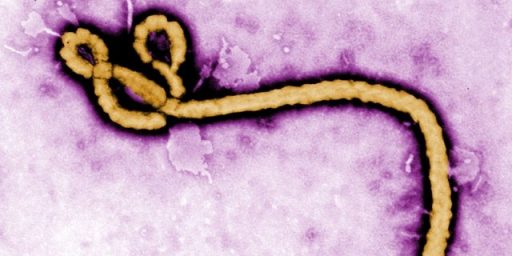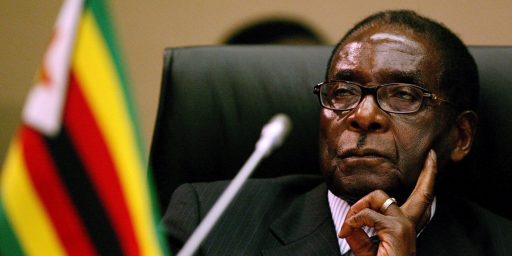Economic Freedom of the World
The Cato Institute has released its Economic World Freedom: 2006 Annual Report. Since 1980, economic freedom has risen quite a bit; going from 5.1 to 6.5, which is a 27% increase. The top ten free economies are,
- Hong Kong–8.7,
- Singapore–8.5,
- New Zealand–8.2,
- Switzerland–8.2,
- United States–8.2,
- Ireland–8.1,
- the United Kingdom–8.1,
- Canada–8.0,
- Iceland–7.9,
- Luxembourg–7.9
Estonia came in at number 12, and Russia is lagging way to the rear at 102 (and is in the company of such countries as Papua New Guinea, Nigeria, Mali, Sierra Leone, and Macedonia). But to be fair to Russia, they did start with a 3.7 in 1995 and 5.6 is their highest score. Interestingly enough, the U.S. peaked in terms of economic freedom back in 2000 with a score fo 8.6. And if you are curious, bringing up the rear in last place is Zimbabwe, with an impressive score of 2.8. Zimbabwe peaked in 1995 and it has been downhill ever since.
Related:
- Freedom and Wealth (James Joyner)





The absence of Saudi Arabia from the survey is puzzling. It’s noted in only one place (dollar value of export manufacturing), but nowhere else.
Nor do I find any explanation for the country’s absence. Guess I’ll have to go ask Cato Instit.
Post any response here John, I’m curious as well.
Anyone want to clue me in on what factors caused the down grade from 8.6 to 8.2?
I think this also speaks to the early post about free markets being a key to economic success. Hong Kong and Singapore both have a very vibrant entrepreneurship culture. But since the turn over Hong Kong has had a huge decrease in political freedom (newspapers censored, no meaningful elections, control from Beijing, etc). Likewise, Singapore has some laws that we would find repressive from a personal freedom standpoint. So this is emphatically delinking personal freedom from economic freedom.
If you believe that economic freedom is a good future predictor of economic power, the only country that is at all a contender to the US is the UK and Hong Kong as it is a part of China.
YAJ – Hong Kong never had much democratic freedoms when it was a British Colony. Only when it was decided it was time to hand over to the PRC did the governor, Chris Patten, decide to allow meaningful democratic elections for the local government. Hong Kong basically traded one colonial master for another. The PRC is far from democratic, but let’s not pretend everything was hunky dorey pre-1997.
8:5 it’s bond-financed debt, i.e. the budget deficit.
There were significant declines in legal structure and security of property rights (peaked in 2000 with 9.2, but declined to 7.8 by 2004). Freedom to exchange with foreigners also took a hit (Hello Mr. Bush and his protectionist policies).
Nope.
steve; what is the purpose of a nation or national boundaries?should citizens expect their government to protect their interests under any circumstances? is a nations standard of living worth any protection? are wages always just theft of profit? should americans be willing to resort to a filthy environment, unsafe working conditions, and child labor, in order to compete for slave wages? is corporate profit the only value a nation should embrace? just asking!
No, your just being annoying.
pretty perceptive! but so many important factors blur the scene.
DC loser,
At one level you are right about HK trading colonial governments. But have you looked at the newspapers. I first went to HK in the early 80’s. There was very little discussion among normal people about HK return to China. What little there was fell into the same category of Southerner’s “The South’s gonna rise again”. The papers were very open in pointing out local scandals by politicians, expressing their views, etc.
I visited several times before turn over and several times since (including less than a month after turn over). Right after the turn over, the paper was running a front page, above the fold article about 13 local high school boys who volunteered to receive training with the PRC army in some sort of a reserve or militia aspect (apparently they were the only 13 who volunteered). The big revelation in the story, the boys were tired after a 10 mile march and the machine gun they took turns carrying was heavy. I haven’t seen nearly as tough of reporting in the papers after the turnover and a lot more puff pieces about the wonders of being part of China. There does seem to be a few writers who continue to try to call the PRC on things, but they are few and you can see they pull their punches.
Dealing with people, I see a lot of the entrepreneur spirit that was very evident prior to the turnover is now missing. Before the turnover, it seemed that most of the people I dealt with working for someone else were just doing it until they could get their own company started. After the turnover, that seems to be missing. Immediately after the turn over, there was a real rarity in seeing shops closed. Before it seemed someone was making economic use out of every space. The number of boarded up shops has declined, but there certainly doesn’t seem to be the same intensity and density there was before.
Some of that is because they are opening up new areas in the colony and just over the border which takes off pressure from the former core of the colony. But HK had a definite brain/entrepreneur drain due to the turnover and they aren’t the same. Those who would talk privately said Singapore was becoming like the old HK.
In short, there is a case to be made that the new boss is the same as the old boss, but there is a definite fact that free speech has taken a big hit in HK.
YAJ – your observations are on the mark, no disagreements with you there. For the record, I was born in HK, my wife is from there, and we have family there. I haven’t been back for many years, but I stay in touch via reports from HK and other media and from family. HK has had a very tough time of late with the 98 crash, the SARS episode, and the crash of the real estate market. I think many who left pre-97 for fear of the communists have returned. But the handwriting is on the wall, as China is pushing hard for Shanghai to replace HK as the new business center of Asia. Most HKers are learning Mandarin, trying to get more business on the mainland. The press is “behaving” for fear of having their people arrested on the mainland. Despite all that, HK is still a remarkably free place and the can-do business attitude is still there. I don’t think Singapore will become the new HK as it lacks that carefree, living on the edge attitude that HK always had being so close to the mainland. But I would keep an eye on Shanghai.
DC Loser
I haven’t visited Shanghai, so I can’t speak to it. I have been to Shenzhen. It is a sprawling, dirty factory town that someone told me was like a land locked Hong Kong, but I didn’t see it. Sure the companies were raiding each others workers, but it seemed most people wanted to be worker bees.
I agree that Singapore doesn’t have the raw, in your face entrepreneurial spirit the old Hong Kong did, but they are closer than the new Hong Kong.